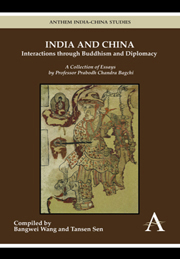 India and China: Interactions through Buddhism and Diplomacy
India and China: Interactions through Buddhism and Diplomacy from Part One
Published online by Cambridge University Press: 05 March 2012
The great Chinese pilgrim Hiuan-tsang was in India for about sixteen years from 630 to 645 A.D. He passed a considerable time at Nālandā in the study of the Buddhist philosophy with the then abbot of the monastery – Śīlabhadra. King Harṣa invited him thrice to the capital and he turned down his request every time. Later on when Harṣa met the pilgrim he asked the latter about the cause of his refusal. Thereupon Hiuan-tsang replied that he had come from far in search of the law of Buddha and for the sake of learning the Buddhist philosophy and that he did not go to meet the king then as he had not finished his studies. This testifies to his great attachment to his studies at Nālandā. His attachment to his Guru Śīlabhadra and to his fellow-students especially to Jñāna-prabha, the chief disciple of Śīlabhadra, was also great.
His Indian friends also reciprocated the same sentiments towards him. This is best shown by the incident which happened at the time of his departure from Nālandā. On hearing that he had decided to go back to China all the monks of the Nālandā monastery came to him in a body and begged him not to go back. They pointed out to him that India was the land of Buddha and that China was not a holy land. They also said that Buddha could never be born in China and that hence the people there could not be meritorious.
To save this book to your Kindle, first ensure [email protected] is added to your Approved Personal Document E-mail List under your Personal Document Settings on the Manage Your Content and Devices page of your Amazon account. Then enter the ‘name’ part of your Kindle email address below. Find out more about saving to your Kindle.
Note you can select to save to either the @free.kindle.com or @kindle.com variations. ‘@free.kindle.com’ emails are free but can only be saved to your device when it is connected to wi-fi. ‘@kindle.com’ emails can be delivered even when you are not connected to wi-fi, but note that service fees apply.
Find out more about the Kindle Personal Document Service.
To save content items to your account, please confirm that you agree to abide by our usage policies. If this is the first time you use this feature, you will be asked to authorise Cambridge Core to connect with your account. Find out more about saving content to Dropbox.
To save content items to your account, please confirm that you agree to abide by our usage policies. If this is the first time you use this feature, you will be asked to authorise Cambridge Core to connect with your account. Find out more about saving content to Google Drive.